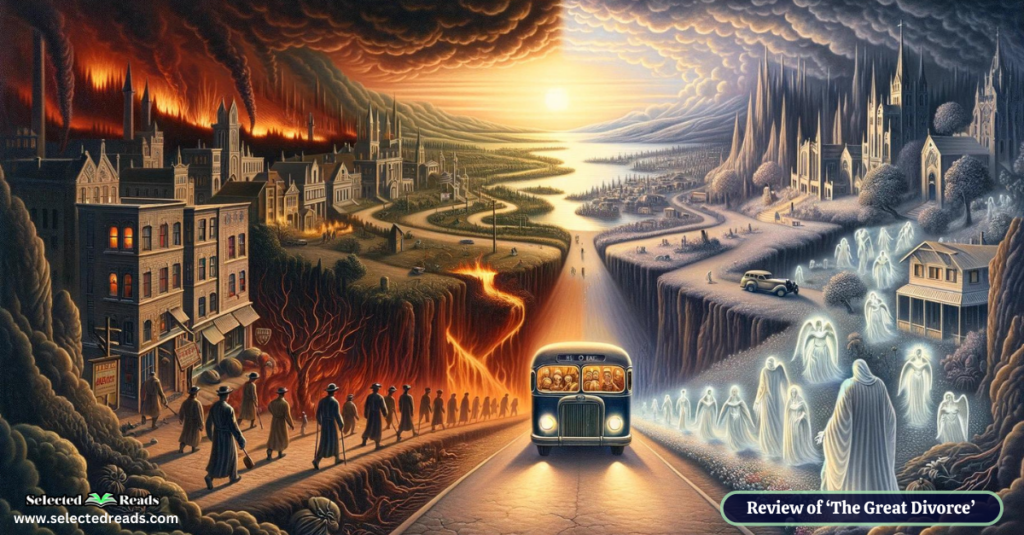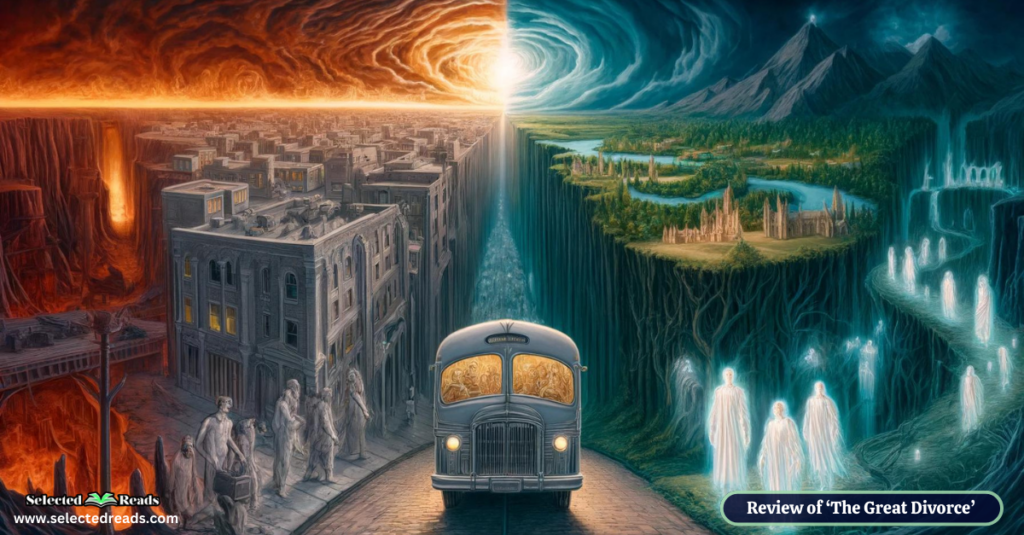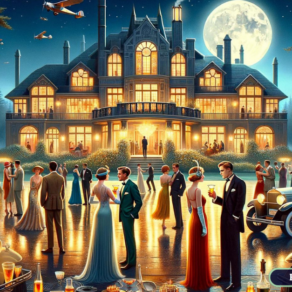Today, we delve into “The Great Divorce” by C.S. Lewis, a novel that occupies a unique space within the realm of spiritual and allegorical literature. This piece stands out for its imaginative exploration of moral and theological concepts, navigating the complex territories of sin, redemption, and the afterlife without giving away the essence of its plot.
In this journey, I’ll first lay out the narrative groundwork, sketching the story’s backdrop and key developments to give you a taste of Lewis’s allegorical universe. Following that, we’ll zoom in on the characters who populate this narrative, each embodying a spectrum of human virtues and vices, their stories offering a mirror to our own struggles and aspirations.
Finally, to engage further with the text and its themes, I’ll present a series of thought-stimulating questions suitable for book club discussions or personal reflection. This structured approach aims to enrich your understanding and appreciation of “The Great Divorce,” inviting you to ponder its profound philosophical questions.
The Great Divorce Summary
“The Great Divorce” by C.S. Lewis embarks on an allegorical journey exploring themes of morality, redemption, and the profound choices between good and evil. The narrative unfolds in a grey, dismal town where it is always twilight, a place that comes to be understood as a suburb of Hell. The protagonist, who is never named—making him an everyman figure—discovers a bus stop where a queue of people are waiting for a bus that will take them to the foothills of Heaven.
The bus ride itself serves as a transition from the drab reality of the grey town to the vibrant, painfully solid reality of Heaven. This change in setting underscores a key thematic element of the book: the stark contrast between the insubstantiality of sin and the robust nature of goodness and reality.
Photo: Amazon
Upon arrival in the outskirts of Heaven, the passengers, who are revealed to be ghosts in comparison to the solid reality of Heaven, are met by “Spirits” or “Bright People,” residents of Heaven, who have come to guide them. These spirits are friends or relatives of the ghosts, who attempt to persuade them to let go of their earthly flaws and choose the joy and reality of Heaven.
Each ghost is faced with a choice that illustrates a particular vice or flawed perspective that has led to their damnation. One ghost is a mother whose love for her son has become possessive and idolatrous, overshadowing her love for God. Another is a man who refuses to abandon the intellectual pride that prevents him from accepting the simplicity of faith. Yet another is a bitter ghost who cannot relinquish his grudges. Through these encounters, Lewis explores various human failings—pride, envy, greed, lust, and wrath—that hinder souls from embracing the joy and ultimate reality of Heaven.
The narrator observes these interactions, noting the varied excuses and justifications the ghosts provide for refusing to stay. The choices they make are revealing: many choose to return to the grey town rather than submit to the vulnerability required to enter fully into Heaven. Lewis uses these allegorical narratives to illustrate his theological point that Hell is a state of self-imposed separation from God, a result of the choices individuals make.
The narrator himself is guided by the writer and scholar George MacDonald, serving as his spiritual mentor. MacDonald explains to the narrator the nature of Heaven and Hell and the significance of the choices made by the ghosts. He elucidates one of the book’s central themes: “There are only two kinds of people in the end: those who say to God, ‘Thy will be done,’ and those to whom God says, in the end, ‘Thy will be done.'”
The book culminates in the narrator’s awakening from his visionary journey, leaving the reader to ponder the allegory’s implications about the nature of salvation, the permanence of spiritual choices, and the transformative power of grace and redemption.
Related: Lying Sam Harris Summary and Takeaways
The Great Divorce Characters
Here’s a brief overview of some of the key characters encountered by the narrator during his journey from Hell to the outskirts of Heaven:
- The Narrator: Serving as the protagonist and a stand-in for the reader, the narrator embarks on the journey from Hell to Heaven, observing and learning from the experiences of others he meets along the way. His character is not deeply described, making him an “everyman” figure through whose eyes the story unfolds.
- George MacDonald: Acting as the narrator’s guide and mentor in Heaven, MacDonald is a real historical figure, a Scottish author and Christian minister whom Lewis admired. In the book, MacDonald explains the spiritual and moral lessons of the encounters with the ghosts.
- The Ghosts: The ghosts are souls from Hell who take the bus to Heaven, each embodying a particular vice or flawed human nature. Notable ghosts include:
- The Intellectual: A ghost bound by pride and intellectual superiority, unwilling to accept the simplicity of faith.
- The Mother: A woman whose love for her son has become possessive and idolatrous, overshadowing her love for God.
- The Artist: A man who prefers the idea of Heaven for the sake of his art, rather than for the love of God.
- The Bitter Ghost: A soul who clings to his grudges and refuses the joy and forgiveness of Heaven.
- The Pampered Woman: A ghost who cannot let go of her earthly vanity and desires for attention and luxury.
- The Bright People (Spirits): Residents of Heaven, these characters are vibrant, solid, and full of joy, contrasting with the insubstantial, ghostly visitors. They include friends or relatives of the ghosts, come to encourage them to let go of their earthly flaws and embrace the joy of Heaven. Each spirit attempts to help a specific ghost overcome their particular vice.
- The Solid People: Other inhabitants of Heaven, these characters represent the full reality and joy of the afterlife, in stark contrast to the ghostly figures who visit from Hell.
The Great Divorce Discussion Questions
Here are some thought-provoking questions to stimulate conversation and deepen the understanding of the book:
- The Nature of Choice and Free Will: How does Lewis use the characters’ choices to explore the concept of free will in the context of salvation and damnation? Discuss how the idea that “Hell is locked from the inside” contributes to the theme of free will.
- The Allegory of Heaven and Hell: What do the contrasting settings of the grey town (Hell) and the bright, solid land (Heaven) symbolize? How do these settings affect the characters, and what do they say about Lewis’s view of the afterlife?
- Transformation and Redemption: Many characters in the book are offered the chance to stay in Heaven but choose to return to Hell. Discuss the significance of transformation and redemption in the book. Why do you think some characters refuse redemption?
- The Role of Pain and Suffering: Lewis suggests that pain and suffering can be transformative and lead to a greater good. How is this idea presented through the experiences of the ghosts and their encounters with the Bright People?
- The Concept of Reality: Lewis contrasts the insubstantiality of the ghosts with the solid reality of Heaven. What does the book suggest about the nature of reality, and how does it relate to spiritual and moral truths?
- Symbolism of the Bus Ride: The bus ride from Hell to Heaven is a central element of the story. What might this journey symbolize, especially in the context of spiritual awakening or conversion?
- Character Analysis: Choose a ghost and a Bright Person pair (e.g., the Mother and her brother, the Artist and the musician). Discuss how their relationship and dialogue illustrate Lewis’s messages about human nature, sin, and redemption.
- Critiques of Modern Society: Lewis incorporates critiques of contemporary society, values, and human behavior through his characters. Identify and discuss these critiques. Do you think they are still relevant today?
- Personal Reflection: Did any character’s story particularly resonate with you or challenge your views? Share personal reflections or experiences that relate to the themes of the book.
- The Title’s Significance: Reflect on the title, “The Great Divorce.” In what ways does it capture the essence of the book’s themes? Consider the implications of “divorce” in the context of the separation between Heaven and Hell, as well as the choices individuals make.
Final thoughts
To wrap up, I trust that this brief exploration has sparked your interest in “The Great Divorce” by C.S. Lewis. This novel is not just a narrative but a journey—a compelling foray into the realms of ethics, spirituality, and the choices that define us. For those who haven’t yet experienced its pages, I wholeheartedly encourage you to dive into this book.









